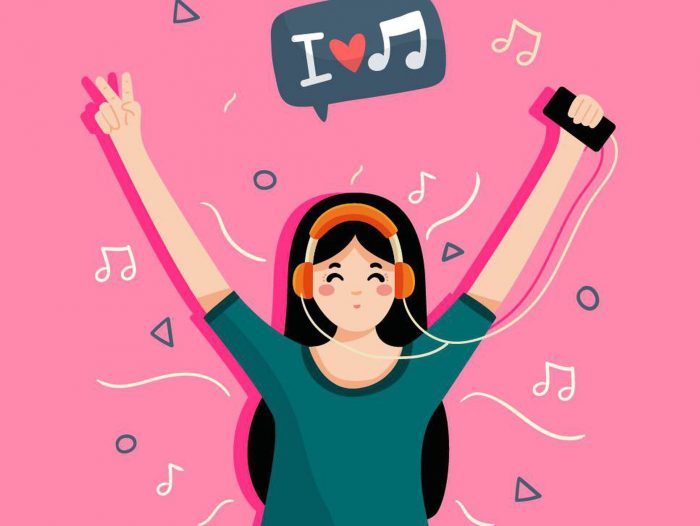In a universe with a variety of sounds that goes beyond simple musical notes, the relationship between music and mental health reveals a wide field of study. How does music affect our emotions and psychological well-being?
The relationship between music and mental health is a topic that has intrigued scientists, psychologists, and music lovers alike. In this context, music is perceived not only as an auditory pleasure, but also as a powerful tool that can significantly influence people’s emotional and psychological well-being.
Various researches have shown that music can play an important role in reducing stress, anxiety and depression. Because of the positive effects music has on mood and general health, it has come to be considered a form of therapy in itself. Sports and clinical psychologist Xaviera Cornejo Schilling highlights that music can act as an emotional expression, allowing people to process and channel their emotions.
He says that “some research suggests that listening to music can reduce stress, anxiety, and depression, as well as improve mood and increase feelings of general well-being.”
Positive impact of music on emotional and psychological well-being
Music not only affects mood, but can also be a therapeutic tool to treat mental disorders such as anxiety and depression. Music therapy, led by trained therapists, uses music in a structured way to address specific therapeutic goals. This approach has proven effective in stress reduction, relaxation, and cognitive stimulation.
According to Javiera Cornejo Schilling, “Music can have a positive impact on people’s emotional and psychological well-being in many ways. “It can act as a form of emotional expression, allowing people to process and channel their feelings.”
Additionally, “music can activate areas of the brain associated with pleasure and reward, which can produce feelings of happiness and satisfaction.” Professionals say it can serve as an effective distraction tool, helping people stay away from negative thoughts or worries.
Music Styles and Their Impact on Mental Health
Regarding the relationship between specific musical genres and better mental health, there is some controversy. Classical and instrumental music is generally associated with positive effects on emotional well-being, but music psychology suggests that personal interpretation and each person’s meaning of the qualities of the music are fundamental factors.
Luis Pino, director of the psychology program at the University of Las Americas (UDLA), highlights that “there is no conclusive scientific evidence that certain types of music will promote greater psychological well-being, but rather there is How “the individual means music and the meaning he gives to that type of music.”
“This means that although there is evidence that music, for example, by Mozart, produces cognitive effects and a sense of well-being and relaxation, we cannot fully imagine that a young person, an adolescent who lives in an urban Listening to music, creating certain spaces of acceptance, of identity, of identifying with one’s peers, will also create positive effects,” he says.
Similarly, he says that “Music is a therapeutic tool that works with certain types of conditions and situations. For example, at first, music would involve a relaxing state and focus on the situation and reduce stress and anxiety. There will be a decrease.
Warnings and thoughts about quitting music
According to psychologist Javiera Cornejo Schilling, sudden abandonment of music is not necessarily a warning sign in itself. However, they argue that “In some people, the sudden abandonment of pleasurable activities such as listening to music or playing an instrument that they enjoy may be an indicator of a change in mood or motivation, suggesting the need for further exploration.” Can give. a complete breakdown of your emotional well-being. But, it is always recommended to analyze the situation one by one, seeing if there are more symptoms that indicate a possible mental health problem.
Music tuning and its effect on mental health
Psychologist Javiera Cornejo indicates that “listening to music that is not compatible with mental health, such as music with negative or violent lyrics, can have a negative impact on some people, especially if they are going through an emotionally vulnerable moment. “
The interpretation of music and its impact may vary depending on each person’s emotional disposition and personal experiences.
Cornejo says that “this type of music may reinforce negative thoughts or painful emotions rather than providing comfort or relief. However, the specific effects of music on mental health can vary significantly between individuals and depend on various contextual and individual factors.
Luis Pino, for his part, emphasizes that “it can undoubtedly influence whether the person has certain psychological conditions before the music, for example, with depressive symptoms and, ultimately, the music will indicate that That if he’s sad or depressed, you feel a little more sad or sad.”
Finally, it is important to note that the relationship between music and mental health is fascinating and the positive impact that music can have on our emotional and psychological well-being should be highlighted without forgetting its ability to reduce stress and anxiety. Could. Its therapeutic role in the treatment of mental disorders; Music is revealed to be a powerful tool that goes beyond mere auditory appreciation.

